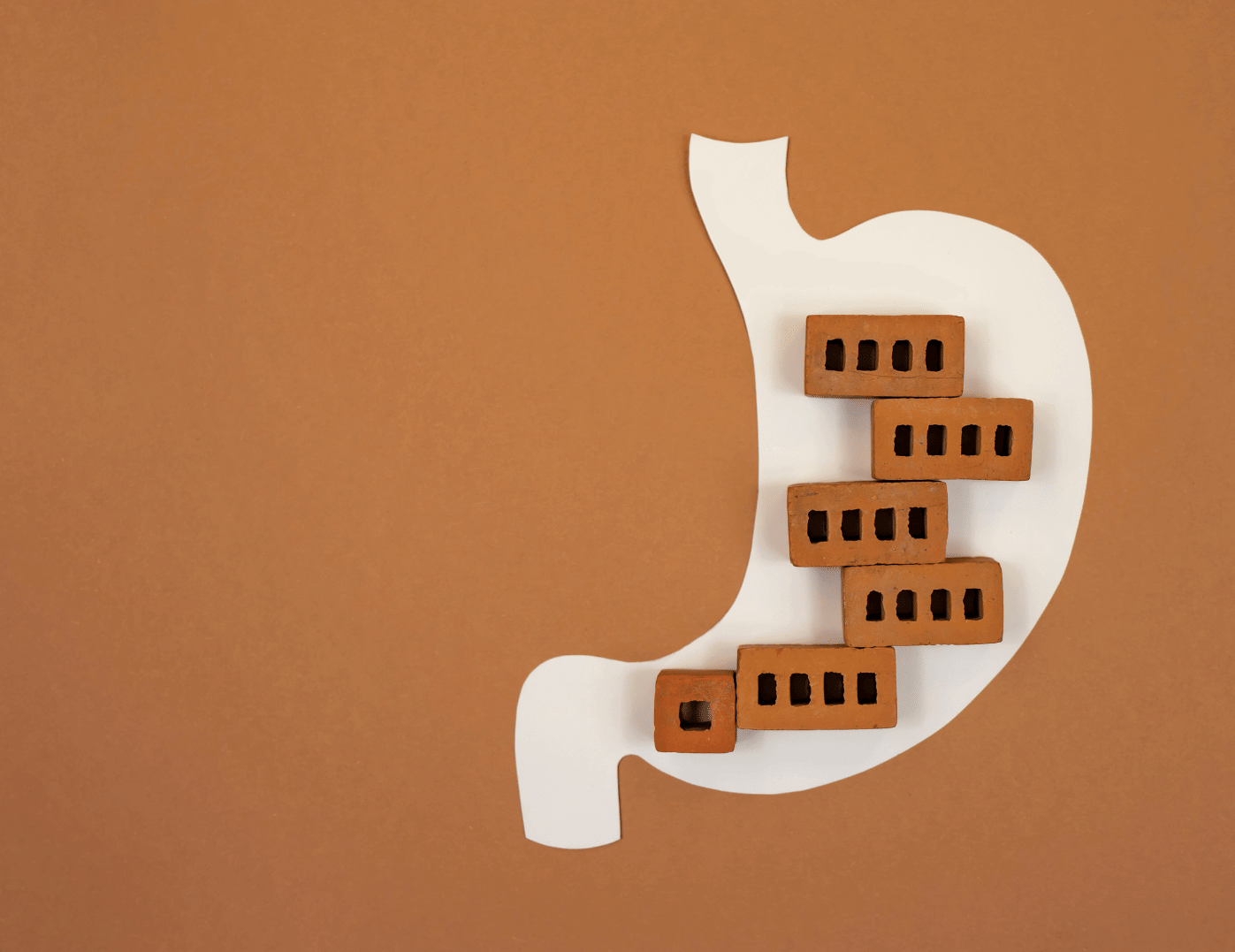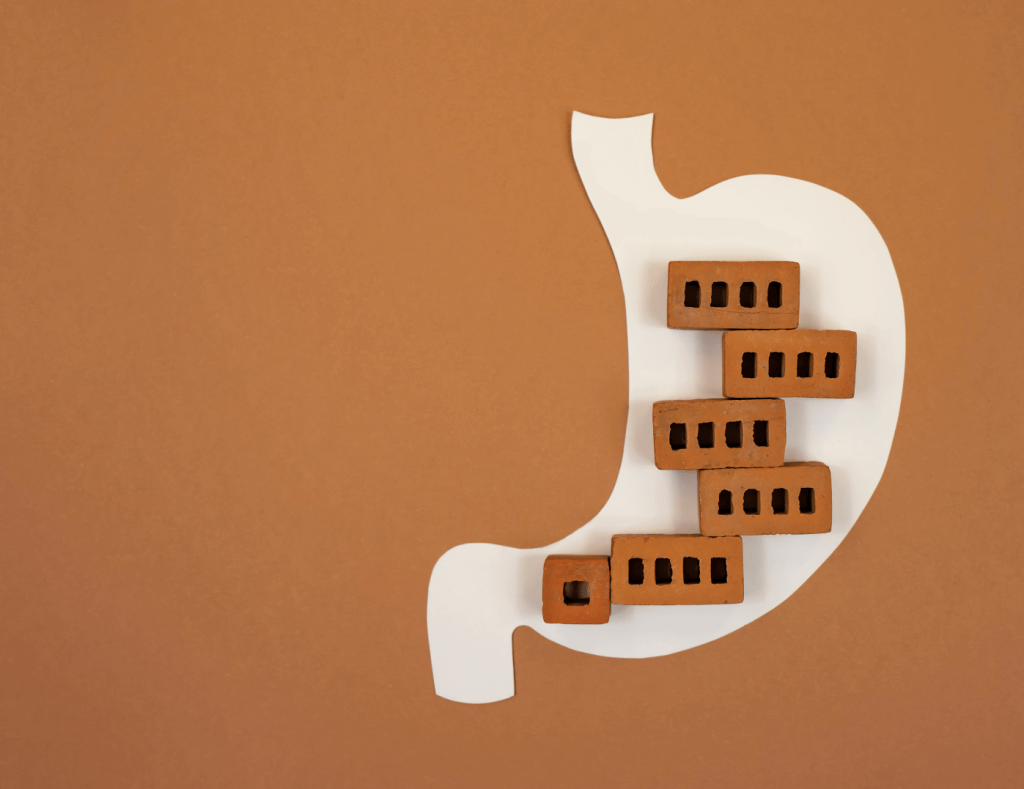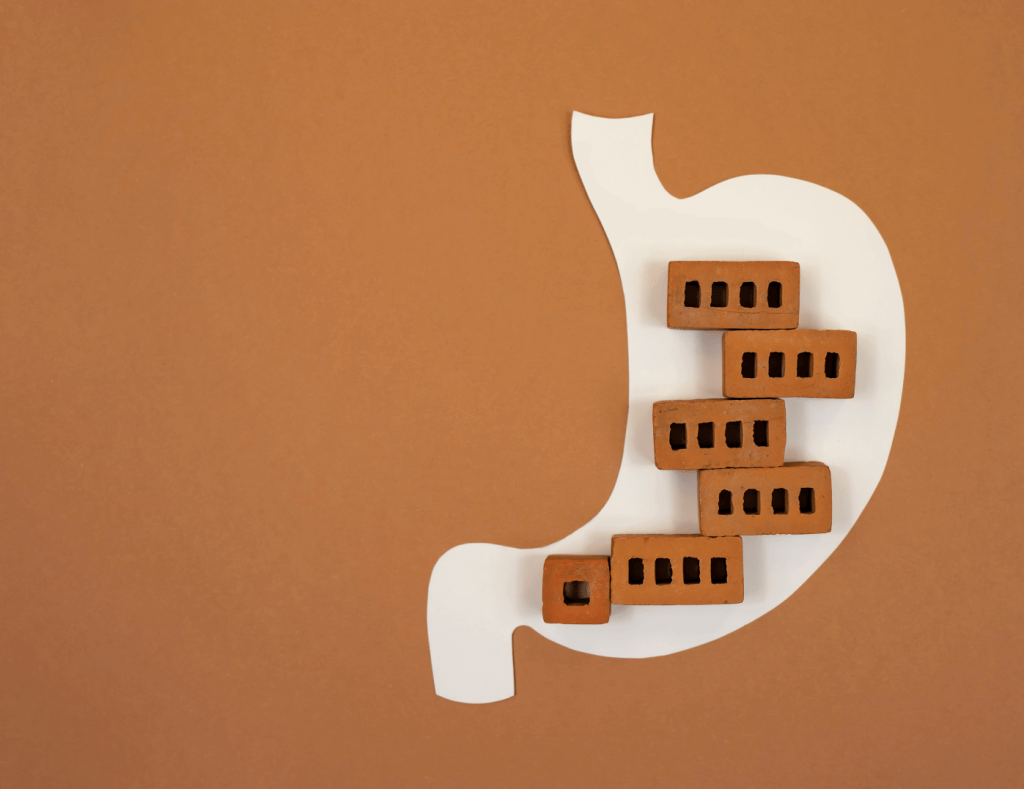
Digestive Enzymes For Bloating And Gas


Digestive Enzymes For Bloating And Gas
Do you often experience uncomfortable bloating and gas after eating? While this may be common, it is not normal. Bloating and gas are linked to suboptimal digestion and gut health, and some foods can make it worse.
In this article, we’ll cover the causes of bloating, how digestive enzymes can help, and the best digestive enzymes or support for each cause of bloating.
Note: Bloating can be a sign of serious medical conditions. You should consult your physician to rule out any serious conditions. This article is only for people with minor digestive discomfort related to diet, lifestyle, or aging once any serious conditions have been ruled out.

What Causes Bloating And Gas?
Gas and bloating are closely connected and often share a common cause. Bloating is the pesky belly expansion that can make you feel like a balloon brings discomfort and tenderness. It’s usually caused by trapped gas or swelling.
But what causes the gas or swelling? Let’s explore some of the most common culprits.
Food Intolerances
Food intolerances occur when you don’t have the enzymes needed to digest certain foods leaving the undigested food for your gut bacteria to ferment and produce gas. It’s more common to experience bloating with food intolerance than a food allergy, especially to sugars and fibers. Intolerances to lactose, FODMAPs, and histamine or biogenic amines can all cause bloating.
If you have intolerances to one of these substances, enzymes that help break them down may relieve the symptoms and allow you to enjoy the foods occasionally. For example:
- Lactase breaks down lactose
- Alpha-galactosidase breaks down many FODMAPs
- Diamine oxidase breaks down histamine in the gut
This is one of the reasons we formulated MassZymes and VegZymes to have lactase and alpha-galactosidase, along with other plant-based enzymes that can break down fermentable plant matter.
Minor Inflammatory Reactions From Foods, Such As Allergies And Sensitivities
Minor inflammatory reactions from food (such as allergies and sensitivities) can often manifest as bloating after consuming them. One common example is gluten sensitivity, which can cause discomfort and bloating in individuals with non-celiac gluten sensitivity. It’s not Celiac disease, although Celiac disease can also cause bloating.
Food sensitivities are different from food allergies, although both can cause bloating. Food allergies tend to present as more acute symptoms such as itchiness, swelling, and wheezing. Severe symptoms can potentially be life-threatening.
Most people get some inflammation from foods and don’t even know it. The best way to find out is through an elimination challenge. This would consist of eliminating potential food culprits until your symptoms subside and then re-introducing them back one at a time in increasing doses. Consider working with a nutritionist or naturopathic doctor to guide you through this process.
Powermove: Consider an elimination-challenge diet
Suboptimal Digestion And Stomach pH
Bloating is often a telltale sign of low stomach acid for the following reasons:
- The stomach acid is your first natural defense against unhealthy microorganisms that come into the gut. Low stomach acid can allow these unhealthy microorganisms associated with bloating into your gut.
- The acidity of your stomach content entering the small intestine helps stimulate gut movement (peristalsis), and the secretions of bile and digestive juices in the small intestine. Inhibiting stomach acid secretion can also disrupt the gut cleansing movement in-between meals
A healthy small intestine typically has very low bacteria count because of stomach acid and the gut cleansing movements. However, low stomach acid can reduce healthy gut movement and may allow more unhealthy bacteria growth in the upper gut, contributing to bloating.
- The high stomach acidity (low pH of 1 – 2) helps activate digestive enzymes in the stomach and subsequent secretions in the small intestine. If your stomach acid is suboptimal, both stomach acid and small intestine digestions will be suboptimal. The slowed down digestion can allow gut microbes to ferment your food or leave food particles to stimulate your immune system, contributing to bloating.
Many factors can reduce stomach acid to suboptimal levels, such as aging and stress. As part of your stress response, digestion is no longer a priority. This slows digestion and reduces your stomach acid. While some stress is normal, the inability to wind down can wreak havoc on your digestion.
Eating in a rush can also make it difficult to digest properly, leading to a couple of problems. The first is swallowing more air which contributes to extra gas. Second, you don’t spend as much time chewing and breaking your food down into smaller pieces to help support proper digestion.
Powermove: HCL Breakthrough can help support healthy stomach acidity, which may relieve bloating and digestive discomfort from suboptimal stomach acid and gut movement.
Suboptimal Bile Production And Flow
Another cause of gas and bloating is not producing enough bile. Bile issues could show up in major discomfort after eating fat and greasy stools that float.
You need bile for two major functions.
- Emulsifying fats, breaking them down into smaller droplets to increase their surface area for better digestion. Undigested fats can serve as fuel for bacterial fermentation in the large intestine. As the intestinal bacteria breaks these fats down, it produces gas and can accumulate, leading to bloating and gas.
- Regulating the movement of food through the digestive tract. Insufficient bile can disrupt the normal transit of food, leading to symptoms such as:
- Bloating
- Indigestion
- Constipation
Powermove: Eat healthy amounts of fats daily to naturally stimulate bile flow. Also, consider digestive bitters to stimulate healthy bile flow.
Dysbiosis Or Imbalanced Gut Bacteria

Gas and bloating may also be caused by gut dysbiosis or an imbalance in your gut bacteria.
Dysbiosis can allow gas-producing bacteria or fungi to grow, ferment the gut content, and produce methane, hydrogen, and carbon dioxide gasses. All of this gas production contributes to your discomfort. Some of these suboptimal gut microbes can also contribute to gut discomfort by interacting with gut nerves and immune cells.
Fixing dysbiosis involves a lot beyond taking probiotics, although probiotics are beneficial. This article explains 6 lifestyle changes to consider in order to improve your gut flora.
Check out this article for a more in-depth look at what causes gas and bloating. And read on to learn more about how to combat gas and bloating: digestive enzymes.
How Do Digestive Enzyme Supplements Help With Bloating And Gas?
Any symptoms of suboptimal digestion or post-meal discomfort suggest that your own digestive enzymes may not be enough. That’s where digestive enzyme supplements come in. They are typically derived from plant, animal, or microbial sources and can supplement your body’s enzyme production.
Let’s take a look at what they can do.
1. Help Break Down Bloat-Inducing Substances
Plant-Based Bloat-Inducing Substances
Naturally, humans eat a diverse range of foods, many of which we don’t have digestive enzymes to digest. These substances may include fibers and strange sugars. In a perfectly healthy gut, the food will be moved down to the large intestine where the healthy gut bacteria helps to digest these extra food substances.
Historically, many cultures have relied on fungi like Aspergillus oryzae, Aspergillus niger, and Saccharomyces cerevisiae in food fermentation processes. So, we’ve been eating foods containing digestive enzymes from these fungi in miso, soy sauce, beers, and more.
Most people nowadays don’t have a habit of eating fermented foods, and have suboptimal gut health and gut movement. These may allow some plant substances to ferment in the gut and cause bloating.
This is why our digestive enzymes include the following enzymes from food-based fungi:
- Glucoamylase
- Pectinase
- Hemicellulase
- Invertase
- Beta-glucanase
- Alpha-galactosidase
- Aspergillus dipeptidyl peptidase IV (DPP IV) that can digest gluten and casein in Gluten Guardian
These enzymes are purified so they come without fungal components, meaning they’re generally safe and effective. However, if you have severe allergies, it’s safest to check with your doctor before trying these supplements.
Bloat From Suboptimal Digestion
If for any reason you have suboptimal levels of digestive enzymes and gut pH, you may just bloat regardless of what you eat. In these cases, proteases, amylases, and lipases from either fungal, plant, or animal sources can help.
An advantage of fungal enzymes is that there are various enzymes that can work in all kinds of pH. Whereas, mammalian (e.g. porcine or bovine) enzymes either need very acidic stomach pH of 1.5 – 3.5 or very alkaline small intestine pH of 6 – 7.4 to work best. Our digestive enzymes include proteases that work from the most acidic to the most alkaline, and the in-between.
Clinical studies tend to show that a more diverse enzyme blend works better for bloating and gut discomfort.
A placebo-controlled study examined 40 subjects experiencing bloating and feelings of fullness after eating. They took a digestive enzyme supplement containing a blend of five enzymes for 60 days. Those taking the enzymes experienced significantly less bloating and discomfort.
In another study of 62 volunteers with common digestive symptoms like gas and bloating, subjects took a full-spectrum blend of digestive enzymes. They took one per meal for five days. They experienced an improvement in all digestive areas, including:
- Inability to finish a meal
- Heavy stomach
- Abdominal bloating
- Abdominal pain
- Heartburn
- Nausea
- Excessive burping
These studies demonstrate that combining multiple enzymes in one supplement is highly effective against uncomfortable bloating. MassZymes contains over ten different enzymes to ensure that the right enzymes are available for you no matter what your meal contains, including those linked to relief from FODMAPs, dairy, and more.
Digestive enzymes, particularly those containing betaine HCl, are beneficial for maintaining a healthy digestive system. Betaine HCl supports healthy stomach acidity and duodenal pH, which is vital for proper digestion. These are also your natural defenses against unhealthy bacterial overgrowth and unhealthy fermentation in the upper gut.
When these pH levels are optimal, it promotes healthy bile flow and gut movement. This minimizes food stagnation in your gut that can cause additional bloating and gas through fermentation.
2. May Help With Dysbiosis
Digestive enzymes may also benefit your gut health by addressing dysbiosis-related causes of gas and bloating.
Other studies regarding the effectiveness of enzymes are primarily done with pigs and applied to humans. This is because they are anatomically and functionally similar to us.
A meta-analysis focused on animal studies explored the effects of digestive enzymes on the gut health of pigs. Supplementing pigs’ food with digestive enzymes resulted in improved gut health, characterized by increased levels of Lactobacillus and a decrease in harmful bacteria. Overall, enzymes seemed to reduce suboptimal bacteria and support a healthy gut microbiome, which promoted gut health.
What Are The Best Digestive Enzymes For Bloating And Gas?
Let’s take a look at various digestive enzyme options to address bloating and gas.

Full-Spectrum Digestive Enzymes
Full-spectrum digestive enzymes means:
- It contains all the enzymes that break down food and bloat-inducing components
- It works across all gut pH, even when your stomach acidity is suboptimal
These formulations can minimize the guesswork and cover your bases. Also, we make sure our digestive enzyme formulas contain very high concentrations of digestive enzymes to:
- Break down bloat-inducing food components such as lactose, FODMAPs, sugar, and fibers
- Ensure healthy digestion of proteins, carbohydrates, and fats
- Break down proteins to help prevent bad bacteria from having fuel to feed off of and ferment in your gut
MassZymes is our most popular full-spectrum digestive enzyme blend, especially if you’re eating a large meal or on a high-protein diet. Many of our customers found other digestive enzymes ineffective before trying and loving MassZymes.
VegZymes is our full-spectrum digestive enzyme formulated specifically for plant-based diets. This is because plant-based diets tend to have less proteins and fats, but more carbohydrates and fermentable plant matter.
Broad-Spectrum Digestive Enzymes
Broad spectrum digestive enzymes may contain many, but not all enzymes that digest food matters. They may also not work across all gut pH levels, especially with suboptimal stomach and small intestine pH.
Most animal-sourced enzymes are broad-spectrum and not full-spectrum, just because they work best with optimal gut pH and not in-between.
Our broad-spectrum digestive enzymes include:
- kApex for high-fat meals. It includes dandelion root to support bile flow, along with high concentrations of proteases and lipases. It’s best for those on ketogenic or low-carb diets.
- Gluten Guardian for high-carb meals, and meals containing gluten or casein.
Lactose Support
If eating dairy causes you to experience gas and bloating, beta-galactosidase or lactase can help with lactose intolerance. A placebo-controlled study of 30 adults with a lactase enzyme deficiency explored the effects of beta-galactosidase on lactose intolerance symptoms.
While all subjects experienced a reduction in bloating when enzymes were added. The effect was greater when the enzymes were added 10 hours before consumption rather than just before drinking milk. [R23] Therefore, consuming milk with pre-added enzymes is likely the most effective, but you can also get some relief when taking beta-galactosidase just before eating or drinking dairy.
BIOptomizers’ MassZymes are full-spectrum digestive enzymes that have got you covered, with lactase included to help tackle lactose intolerance.
Gluten Support
If gluten causes you bloating, the enzyme Aspergillus dipeptidyl peptidase IV (DPP IV) may provide some relief or help you recover faster.
A placebo-controlled study of 12 healthy adults assessed the effectiveness of DPP IV in degrading gluten. Subjects consumed meals with 5.2 grams of gluten (about two slices of wheat bread).
Regardless of the meal’s caloric density, the enzyme efficiently broke down nearly all the gluten in the stomach within 1 hour. In contrast, gluten remained in the stomach for 3 hours with the placebo.
Another study combined DPP IV and pepsin (a protease enzyme found in the stomach) to break down gluten. Researchers established that the combination of these two enzymes surpassed the individual effectiveness of either enzyme alone. This is why we combined DPP IV with a high concentration of proteases in Gluten Guardian.
You can find DPP IV and protease in Gluten Guardian to help support gluten and dairy digestion and reduce gas and bloating. Regardless of your gluten-free diet, many restaurants lack dedicated areas for preparing gluten-free foods. As a result, there is always a potential risk of exposure to gluten whenever you dine out.
Please note that while it may relieve occasional minor gluten exposure, it’s not a miracle supplement and will not allow Celiacs or very sensitive individuals to eat gluten. You still won’t be able to enjoy bread and pasta.
Stomach pH Support: Betaine HCl
Taking betaine HCl with your meals may help alleviate gas and bloating issues caused by low stomach acid.
In a review, researchers explored the use of betaine HCl with meals to address low stomach acid. They determined that taking betaine HCl quickly re-acidifies the stomach to optimal pH levels. Researchers made recommendations on how to take it best:
- Begin by taking between 350-750 mg of betaine HCl with a protein-containing meal and slowly work up to tolerance.
- Take smaller amounts with smaller meals.
- Signs of intolerance generally indicate that your stomach acid levels are returning to normal.
- Do not empty betaine HCl into drinks to avoid tissue and teeth irritation.
- It should not be used by those suffering from peptic ulcers.
Once again, BIOptimizers has got you covered with a great betaine HCl supplement with an extra digestive bonus. HCL Breakthrough contains 100% plant-based betaine HCl along with digestive enzymes that work best in acidic conditions. That means you can restore optimal stomach digestion to support overall digestion.
How Long Does It Take For Digestive Enzymes To Work For Bloating And Gas?
So, you’ve decided to start taking digestive enzymes, but how quickly will you experience relief? Well, that depends on the cause of your bloating as well as a few other factors.
When you take digestive enzymes just before or with your meals, they work immediately (within 15 minutes to a few hours) to prevent any gas or bloating that may occur. They actively assist in digestion as your food moves through your system.
To ensure optimal results, taking digestive enzymes with each meal that typically triggers your gas or bloating is important. Remember, the effects of the enzymes don’t carry over to your next meal, so we recommend being consistent.
If the bloating comes from other causes such as an overgrowth or other types of fermentation in your gut, digestive enzymes may be less effective. In this case, consider seeing a functional or naturopathic doctor to assess and treat the overgrowth.
By combining the regular use of digestive enzymes with avoiding trigger foods and good eating hygiene, you can expect greater relief from gas and bloating symptoms. Give yourself the best chance for comfort by supporting your digestion with enzyme supplementation and mindful food choices.
Takeaway
Bloating and gas are uncomfortable and can affect your quality of life. The effectiveness of digestive enzymes may vary among individuals. However, supplementation with appropriate enzymes and mindful food choices can provide relief, support optimal digestion, and ultimately enhance your overall well-being and comfort. You can get started by:
- Speaking to your doctor to rule out any serious conditions
- Determining what foods may be bothering you with an elimination diet or with your naturopathic doctor or nutritionist
- Taking full-spectrum enzymes like MassZymes to break down a variety of foods
- Supporting healthy stomach pH with HCL Breakthrough
- Trying out Gluten Guardian to support gluten and dairy digestion if you consume these foods
Check out this article if you’re curious how digestive enzymes compare to probiotics.
References
- Gargano D, Appanna R, Santonicola A, et al. Food allergy and intolerance: A narrative review on nutritional concerns. Nutrients. 2021;13(5):1638. doi:10.3390/nu13051638
- Seo AY, Kim N, Oh DH. Abdominal bloating: pathophysiology and treatment. J Neurogastroenterol Motil. 2013;19(4):433-453. doi:10.5056/jnm.2013.19.4.433
- Tuck CJ, Biesiekierski JR, Schmid-Grendelmeier P, Pohl D. Food intolerances. Nutrients. 2019;11(7):1684. doi:10.3390/nu11071684
- Roszkowska A, Pawlicka M, Mroczek A, Bałabuszek K, Nieradko-Iwanicka B. Non-celiac gluten sensitivity: A review. Medicina (Kaunas). 2019;55(6):222. doi:10.3390/medicina55060222
- Greenwood B, Davison JS. The relationship between gastrointestinal motility and secretion. Am J Physiol Gastrointest Liver Physiol. 1987;252(1):G1-G7. doi:10.1152/ajpgi.1987.252.1.g1
- Verkijk M, Gielkens HAJ, Lamers CBHW, Masclee AAM. Effect of gastrin on antroduodenal motility: role of intraluminal acidity. Am J Physiol Gastrointest Liver Physiol. 1998;275(5):G1209-G1216. doi:10.1152/ajpgi.1998.275.5.G1209
- Huerta-Franco MR, Vargas-Luna M, Tienda P, Delgadillo-Holtfort I, Balleza-Ordaz M, Flores-Hernandez C. Effects of occupational stress on the gastrointestinal tract. World J Gastrointest Pathophysiol. 2013;4(4):108-118. doi:10.4291/wjgp.v4.i4.108
- Keller J, Layer P. The pathophysiology of malabsorption. Viszeralmedizin. 2014;30(3):150-154. doi:10.1159/000364794
- Hundt M, Basit H, John S. Physiology, Bile Secretion. StatPearls Publishing; 2022.
- DeGruttola AK, Low D, Mizoguchi A, Mizoguchi E. Current understanding of dysbiosis in disease in human and animal models. Inflamm Bowel Dis. 2016;22(5):1137-1150. doi:10.1097/MIB.0000000000000750
- Pérez JC. The interplay between gut bacteria and the yeast Candida albicans. Gut Microbes. 2021;13(1):1979877. doi:10.1080/19490976.2021.1979877
- Banaszak M, Górna I, Woźniak D, Przysławski J, Drzymała-Czyż S. Association between gut dysbiosis and the occurrence of SIBO, LIBO, SIFO and IMO. Microorganisms. 2023;11(3):573. doi:10.3390/microorganisms11030573
- Manichanh C, Eck A, Varela E, et al. Anal gas evacuation and colonic microbiota in patients with flatulence: effect of diet. Gut. 2014;63(3):401-408. doi:10.1136/gutjnl-2012-303013
- Wei L, Singh R, Ro S, Ghoshal UC. Gut microbiota dysbiosis in functional gastrointestinal disorders: Underpinning the symptoms and pathophysiology. JGH Open. 2021;5(9):976-987. doi:10.1002/jgh3.12528
- Ehren J, Morón B, Martin E, Bethune MT, Gray GM, Khosla C. A food-grade enzyme preparation with modest gluten detoxification properties. PLoS One. 2009;4(7):e6313. doi:10.1371/journal.pone.0006313
- Garvey SM, Guice JL, Hollins MD, Best CH, Tinker KM. Fungal digestive enzymes promote macronutrient hydrolysis in the INFOGEST static in vitro simulation of digestion. Food Chem. 2022;386(132777):132777. doi:10.1016/j.foodchem.2022.132777
- Fallingborg J. Intraluminal pH of the human gastrointestinal tract. Dan Med Bull. 1999;46(3):183-196. Accessed June 14, 2023. https://pubmed.ncbi.nlm.nih.gov/10421978/
- Majeed M, Majeed S, Nagabhushanam K, et al. Evaluation of the safety and efficacy of a multienzyme complex in patients with functional dyspepsia: A randomized, double-blind, placebo-controlled study. J Med Food. 2018;21(11):1120-1128. doi:10.1089/jmf.2017.4172
- Quinten T, Philippart JM, De Beer T, Vervarcke S, Van Den Driessche M. Can the supplementation of a digestive enzyme complex offer a solution for common digestive problems? Arch Public Health. 2014;72(S1):P7. doi:10.1186/2049-3258-72-s1-p7
- Guilliams TG, Drake LE. Meal-time supplementation with betaine HCl for functional hypochlorhydria: What is the evidence? Integr Med (Encinitas). 2020;19(1):32-36.
- Walters EM, Prather RS. Advancing swine models for human health and diseases. Mo Med. 2013;110(3):212-215.
- Ramani S, Recharla N, Hwang O, Jeong J, Park S. Meta-analysis identifies the effect of dietary multi-enzyme supplementation on gut health of pigs. Sci Rep. 2021;11(1):7299. doi:10.1038/s41598-021-86648-7
- Montalto M, Nucera G, Santoro L, et al. Effect of exogenous beta-galactosidase in patients with lactose malabsorption and intolerance: a crossover double-blind placebo-controlled study. Eur J Clin Nutr. 2005;59(4):489-493. doi:10.1038/sj.ejcn.1602098
- Salden BN, Monserrat V, Troost FJ, et al. Randomised clinical study: Aspergillus niger-derived enzyme digests gluten in the stomach of healthy volunteers. Aliment Pharmacol Ther. 2015;42(3):273-285. doi:10.1111/apt.13266
